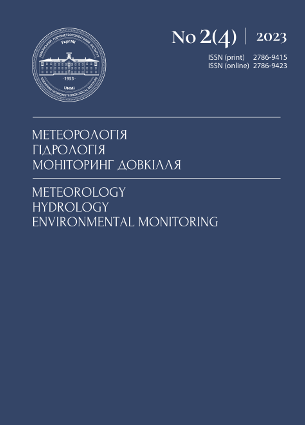MODERN WATER CONFLICTS AND CONFRONTATIONS (HYDROGEOLOGICAL ASPECT)
Ukrainian Hydrometeorological Institute, Kyiv
https://orcid.org/0000-0002-5791-5354
Abstract
References
1. Diatel, O.O. (2019). The formation of water exchange and its forecasting in the conditions of technogenesis in the reclaimed territories of Volyn Polissia. Dissertation abstract for the degree of a candidate of technical sciences in the speciality 06.01.02 'Agricultural land reclamation' (technical sciences). Institute of Water Problems and Melioration, National Academy of Agrarian Sciences of Ukraine, Kyiv. [in Ukrainian].
2. Kamzist, J.S., Shevchenko, O.L. (2009). Hydrogeology of Ukraine. Kyiv. [in Ukrainian].
3. Kats, D.M., Pashkovsky, I.S. (1988). Reclamation hydrogeology. Moscow: VO “Agropromizdat”. [in Russian].
4. The E-40 international waterway project is doomed to failure. (2021). https://necu.org.ua/proyekt-mizhnarodnogo-vodnogo-shlyahu-e40-pryrechenyj-na-proval/ [in Ukrainian].
5. Siegel, Seth, M. (2021). Let there be water. Israel's experience in solving the global problem of water shortage. Kyiv: Yakaboo Publishing. [in Ukrainian].
6. Tvedt, T. (2013). Journey to the future of water. Kyiv: Nika Center. [in Ukrainian].
7. Khilchevskyi, V.K. (2022). Water and armed conflicts–classification features: in the world and in Ukraine. Hydrology, hydrochemistry and hydroecology, 1(63), 6-19. https://doi.org/10.17721/2306-5680.2022.1.1 [in Ukrainian].
8. Shevchenko, O., Bublias, V., Oshurok, D. (2023). Analysis of geophysical, meteorological and hydrogeological data to explain in consistencies between in filtration and atmospheric precipitation. Bulletin of Taras Shevchenko Kyiv National University (Geology), 1 (100), 111-123. http://doi.org/10.17721/1728-2713.100.13. [in Ukrainian].
9. Shevchenko, O.L., Dolin, V.V., Shabatura, O.V. (2021). Hydrogeology of mineral deposits: a textbook. Kyiv: VOC 'Kyiv University'. [in Ukrainian].
10. Shevchenko, O.L., Dolin, V.V., Orlov, O.O., Shabalin, B.G., Kireev, S.І., Azimov, O.T. etc. (2023). Radiohydrogeochemistry of catchment basins of the Chernobyl Exclusion Zone. Editors: Shevchenko, O.L., Dolin, V.V. Kyiv: Scientific Opinion. http://doi.org/10.15407/978-966-00-1855-6. [in Ukrainian].
11. Shevchenko, A.L., Skorbun, A.D., Charny, D.V. (2021). Subordination of groundwater level fluctuations in the Southern Bug river basin to climatic changes. Bulletin of Odesa National University. Ser.: Geographical and geological sciences, 26, 2(39), 175-194. [in Ukrainian].
12. Shevchenko, O.L., Khrushchev, D.P. (2021). Theoretical and applied principles of economical use of groundwater. Infogeoframes in hydrogeology. Bulletin of Taras Shevchenko Kyiv National University (Geology). Issue 3 (94). 109-120. http://doi.org/10.17721/1728-2713.94.14. [in Ukrainian].
13. Caponera, D.A., Nanni, M. (2019). Principles of Water Law and Administration: National and International. Routledge: London, UK.
14. Diatel, O.O. (2018). Calculations and prognosis of the influence of the exploitation of the “Hotyslavs’ke” quarry on the hydrodynamics of the ground and underground waters of the western Polissya. Environmental safety and nature management, 26, 65-76.
15. Evans, R., Clifton, C. (2001). Environmental water requirements to maintain groundwater dependent ecosystems. Environment Australia and Natural Heritage Trust (Australia) and Sinclair Knight Merz (Firm). Canberra, A.C.T.: Environment Australia. https://nla.gov.au/nla.cat-vn1888404
16. Fraser, C.M., Kukurić, N., Dmitrieva, T., Dumont, A. (2023). Transboundary water cooperation under SDG indicator 6.5.2: disaggregating data to provide additional insights at the aquifer level. Water Policy. 25 (11), 1015–1034. https://doi.org/10.2166/wp.2023.026
17. Gleick, P. (1993). Water and Conflict: Fresh water resources and international security. International Security, 18(1), 79-112.
18. Gökçekus, Н., Bolouri, F. (2023). Transboundary Waters and Their Status in Today’s Water-Scarce World. Sustainability,15, 4234. https://doi.org/10.3390/su15054234
19. Hunt, M., Marandi, A., Retike, I. (2023). Water Balance Calculation for a Transboundary Aquifer System between Estonia and Latvia. Water, 15(19), 3327. https://doi.org/10.3390/w15193327
20. Hussein, H., Menga, F., Greco, F. (2018). Monitoring transboundary water cooperation in SDG 6.5.2: How a critical hydropolitics approach can spot in equitable out comes. Sustainability.10, 3640.
21. Khilchevskyi, V.K., Shevchenko, O.L., Plichko, L.V. (2023). Hydropolitical aspects in the field of water use. In Proc. 17-th International Scientific Conference: Monitoring of Geological Processes and Ecological Condition of the Environment. (7-10 November 2023, Kyiv, Ukraine). European Association of Geoscientists & Engineers, Mon 23-051. 1–5.
22. Kløve, B., Ala-aho, P., Bertrand, G., Boukalova, Z. et al. (2011). Groundwater dependent ecosystems. Part I: Hydroecological status and trends, Environmental Science & Policy, 14, 7, 770-781. https://doi.org/10.1016/j.envsci.2011.04.002.
23. Mianabadi, A., Davary, K., Mianabadi, H., Karimi, P. (2020). International environmental conflict management in transboundary river basins. Water Resour. Manag, 34, 3445–3464.
24. Offutt, A. (2022). Mixing waters: Stake holder influence in transboundary water conflict and cooperation. Water Int., 47, 583–609.
25. Shams, A.K., Muhammad, N.S. (2022). Towards sustainable transboundary water cooperation between Afghanistan and Pakistan: A case study of Kabul River. Ain Shams Eng. J. 14, 101842.
26. Shevchenko, O., Menshov, O. (2019). Wind power stations construction at the mountain ecosystem – risk assessment and monitoring techniques. 18-th International Conference «Geoinformatics – Theoretical and Applied Aspects». Geoinformatics 2019, Kyiv, Ukraine. Conference Paper, art. no. 15501.
27. Sindico, F. (2016). Transboundary Water Cooperation and the Sustainable Development. UNESCO: Paris, France.
28. Wachniew, P., Witczak, S., Postawa, A., Kania, J., Żurek, A., Różański, K., Duliński, M. (2014). Groundwater Dependent Ecosystems and man: conflicting groundwater uses. Geological Quarterly, 58 (4), 695–706. https://doi: 10.7306/gq.1168

